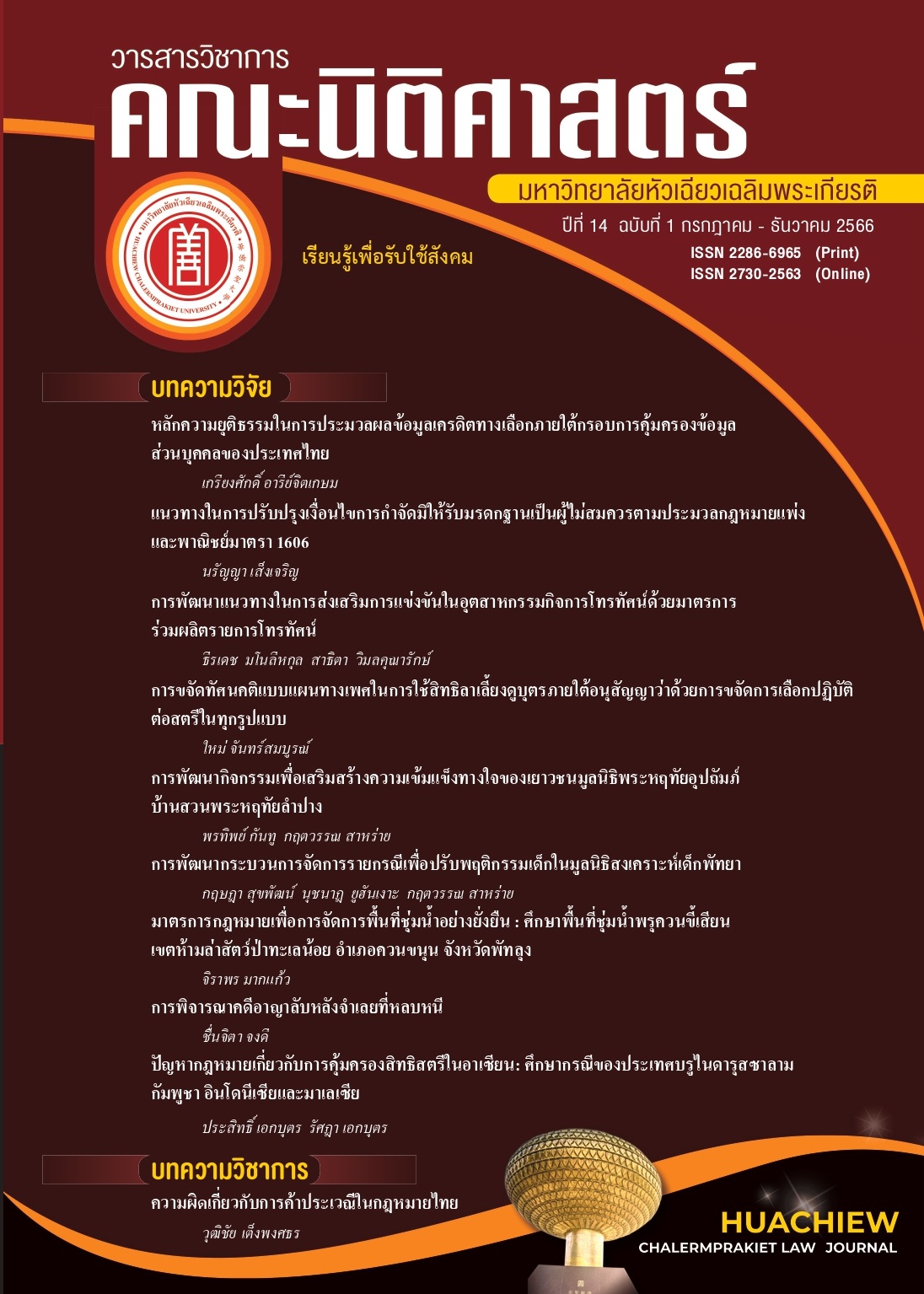Fairness Principle in the Processing of Alternative Credit Data under the Thai Personal Data Protection Framework
Keywords:
Fairness principle, Non-discrimination, Processing of Alternative Credit DataAbstract
The purpose of this research article is to (1) study and review the origin, legal concept and practice of fairness principle in the protection of personal data, (2) examine the criteria and elements in law that determine fairness as applied to the processing of alternative credit data, and (3) analyze and evaluate whether the Thai personal data protection framework properly provides the data subject with fairness in the processing of alternative credit data by employing a qualitative research method and making a comparative analysis with foreign laws, frameworks, guidelines, and relevant cases. This study found that (1) fairness is an important and multifaceted concept of the protection of personal data and fundamental human rights; (2) the current technology and practice regarding the processing of alternative credit data brings the risk of discrimination based on sensitive data and by machine; (3) the Thai Personal Data Protection Act, 2019 (B.E. 2562) has not yet established principle of fairness in the case of alternative credit data processing. This study therefore proposes to establish fairness principle in the personal data protection law to ensure that the data subject's decision is immune from unfair treatment or discrimination, by human or machine, even after giving consent.
References
Binns, R., & Kirkham, R., “How could equality and data protection law shape AI fairness for people with disabilities?.” (2021) 14:3 ACM Transactions on Accessible Computing (TACCESS).
Borgesius, F. Z., & Poort, J., “Online price discrimination and EU data privacy law.” (2017) 40:3 J. Consumer Pol'y.
Broeders, D., Schrijvers, E., van der Sloot, B., Van Brakel, R., de Hoog, J., & Ballin, E. H., “Big Data and security policies: Towards a framework for regulating the phases of analytics and use of Big Data.” (2017) 33:3 Computer Law & Security Review.
Consumerfinance, CFPB Orders GE Capital to Pay $225 Million in Consumer Relief for Deceptive and Discriminatory Credit Card Practices, (9 February 2023) cfpb-orders-ge-capital-to-pay <https://www.consumerfinance.gov/about-us/newsroom/cfpb-orders-ge-capital-to-pay-225-million-in-consumer-relief-for-deceptive-and-discriminatory-credit-card-practices/>.
FDIC's, “Supervisory Policy on Predatory Lending.” (15 February 2023) financial-institution-letters <https://www.fdic.gov/news/financial-institution-letters/2007/fil07006a.html>.
Gathergood, J., Guttman-Kenney, B., & Hunt, S., “How do payday loans affect borrowers? Evidence from the UK market.” (2019) 32:2 The Review of Financial Studies.
Edpb, Italian SA fines US company offering diabetes app (9 February 2023) italian-sa-fines-us-company-offering-diabetes-app <https://edpb.Europa.eu/news/national-news/2022/italian-sa-fines-us-company-offering-diabetes-app_en>.
Edpb, The Portuguese Supervisory Authority fines the Portuguese National Statistics Institute (INE) 4.3 million EUR, December 19, 2022. (9 February 2023) portuguese-supervisory-authority-fines-portuguese-national-statistics <https://edpb.europa.eu/news/national-news/2022/Portuguese-supervisory-authority-fines-portuguese-national-statistics_en>.
Eubanks, V., Automating inequality: How high-tech tools profile, police, and punish the poor (New York: St. Martin's Press, 2018).
Gillis, T. B. False dreams of algorithmic fairness: The case of credit pricing (Cambridge; Harvard University Press, 2020).
Hänold, S, “Profiling and Automated Decision-Making: Legal Implications and Shortcomings.” In Marcelo Corrales, Mark Fenwick, & Nikolaus Forgó (ed), Robotics, AI and the Future of Law (Singapore: Springer, 2018).
Hurley, M., & Adebayo, J., “Credit scoring in the era of big data.” (2016) 18 Yale Journal of Law & Technology.
Ingold, D., & Soper, S., Amazon Doesn’t Consider the Race of Its Customers. Should It?, BLOOMBERGB (21 April 2016) graphics <https://www.bloomberg.com/graphics/2016-amazon-same-day/>.
Johnson, Kristin, Frank Pasquale, and Jennifer Chapman. "Artificial intelligence, machine learning, and bias in finance: toward responsible innovation." (2019) 88:2 Fordham L. Rev.
Khaosanit, D., Legal measures in private data protection : case study in finance and banking of commercial bank. (15 December 2021) Thesis <http://libdoc.dpu.ac.th/thesis/Dawan.Kha.pdf>.
Letzter, R., Amazon Just Showed Us That “Unbiased’ Algorithms Can Be Inadvertently Racist, BUS.INSIDER (21 April 2016) how-algorithms-can-be-racist <http://www.businessinsider.com/how-algorithms-can-be-racist-2016-4>.
MacMillan, Rory. "Big Data, Machine Learning, Consumer Protection and Privacy." Paper presented at the 47th Research Conference on Communication, Information and Internet Policy, American University, Washington College of Law, Washington, D.C., 26 July 2019).
Malgieri, G. “The concept of fairness in the GDPR: a linguistic and contextual interpretation.” (Paper presented at the Conference on fairness, accountability, and transparency, New York, United States, 27-30 January 2020).
O'neil, C., Weapons of math destruction: How big data increases inequality and threatens democracy (New York: Crown Publishers, 2016).
Phillips, R., “Optimizing prices for consumer credit.” (2013) 12:4 Journal of Revenue and Pricing Management.
RightsCon. Toronto, The Toronto Declaration: Protecting the rights to equality and non-discrimination in machine learning systems (16 May 2018) Systems< https://www.accessnow.org/the-toronto-declaration-protecting-the-rights-to-equality-and-non-discrimination-in-machine-learning-systems/>.
Srichola, S. & Tipayanee, P., “Legal Issues Related to Credit Information on the Use of Credit Information for Other Purposes.”
(2016) 4:3 DPU Graduate Studies Journal.
Staten, M., “Risk-Based Pricing in Consumer Lending.” (2015) 11 Journal of Law, Economics & Policy.
Terry, N. P., “Protecting patient privacy in the age of big data.” (2012) 81:2 UMKC Law Review.
United Nations Legislation, (a) Universal Declaration of Human Rights, 1948, (b) International Covenant for Civil and Political Rights, 1966, (c) International Covenant on Economic, Social and Cultural Rights, 1966, (d) Convention on the Elimination of All forms of Racial Discrimination, 1966, (e) Convention on the Elimination of All forms of Discrimination Against Women, 1979 (15 Jan 2023) Ohchr <http://www.ohchr.org>.
World Bank and Consultative Group to Assist the Poor (CGAP), Data Protection and Privacy for Alternative Data, GPFI-FCPL Sub-Group Discussion Paper Draft May 4, 2018 (15 Dec 2022) The Global Partnership for Financial Inclusion <https://www.gpfi.org/sites/gpfi/files/documents/Data_Protection_and_Privacy_for_Alternative_Data_WBG.pdf>.
World Bank Group, Good Practices for Financial Consumer Protection, 2017 Edition (United States: The World Bank, 2017).
World Bank and Global Partnership for Financial Inclusion, G20 High‐Level Principles for Digital Financial Inclusion (15 Jan 2023) The Global Partnership for Financial Inclusion <https://www.gpfi.org/sites/gpfi/files/G20%20High%20Level%20Principles%20for%20Digital%20Financial%20Inclusion.pdf>.
Grady, R. C., Montes, H., Fredesvinda F., & Traversa, M., Financial Consumer Protection and New Forms of Data Processing Beyond Credit Reporting (English) (United States : The World Bank, 2018).
Zim, J., The Use of Social Data Raises Issues for Consumer Lending (28 April 2016) issues .
Downloads
Published
How to Cite
Issue
Section
License
Copyright (c) 2023 Huachiew Chalermprakiet Law Journal

This work is licensed under a Creative Commons Attribution-NonCommercial-NoDerivatives 4.0 International License.
บทความหรือข้อความคิดเห็นใด ๆ ที่ปรากฏในวารสารฉบับนี้เป็นวรรณกรรมของผู้เขียนโดยเฉพาะ คณะนิติศาสตร์มหาวิทยาลัยหัวเฉียวเฉลิมพระเกียรติ และกองบรรณาธิการไม่มีส่วนรับผิดชอบหรือไม่จำเป็นต้องเห็นด้วยกับข้อคิดเห็นนั้น แต่ประการใด








